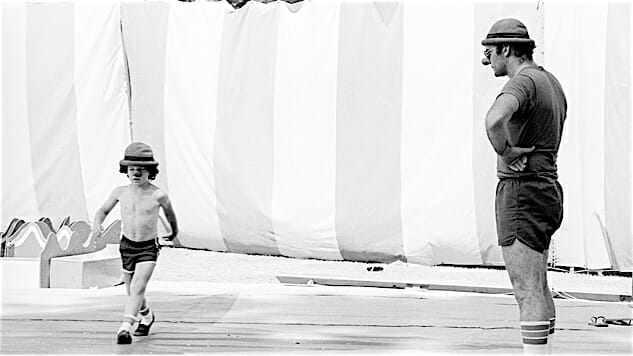Pomp and Circus-stance: A Little Film about the Pickle Family Circus Shows The Greatest Showman a Thing or Two

So I was sitting in the cinema with my daughters wading through the ponderous volley of trailers and nauseating Coke ads that we had to submit to in order to watch Thor: Ragnarok. Suddenly, in hypersaturated color, there was Hugh Jackman in a circus ring. A PT Barnum musical? Like, another one? Was the Reboot Machine fired up to take another stab at that musical? I remembered that musical. Jim Dale. Glenn Close. 1979? 1980? We’d had it on vinyl when I was a kid. I listened to it all the time. It combined conventions of musical theater with the spectacle of the circus and considered, if not that searingly, the value of “humbug” in the context of a man whose first “act” was a slave he purchased and marketed as the oldest woman in the world and the former wet-nurse of George Washington.
But no, this had totally different music, and Hugh Jackman clearly being positioned as Mister Awesomesauce, giving the Freaks a Freakflag behind which to rally with pride and celebrate the glorious diversity of the world’s creatures. There was nothing about buying people.
“This seems like it’ll probably be questionable,” I said to Grace, “but I’d watch Hugh Jackman pay his bills online for two hours.”
“He probably has an admin,” Grace whispered back.
“Shh!” Grace’s sister Camille was getting impatient, so I shhhh’d.
A couple weeks later I was offered a peek at The Greatest Showman’s polar opposite—a very human, no smoke, no mirrors documentary premiering on SundanceTV, about Lorenzo Pisoni, who grew up in the Pickle Family Circus. The Pickles were not really part of my childhood, which I expect makes me a minority in Bay Area-raised people of my generation, but I certainly knew they’d been a game-changing force in how “circus” was conceptualized. PT Barnum displayed “curiosities,” exotic animals and exotic human beings—Larry Pisoni used clowning to ponder gender politics and class issues—and the nature of family. Both ringmasters came from nothing, propelled themselves into the spotlight through pure tenacity and voltage, and had probably spent their lives hungering at some level for the approval of absent parents. Beyond that, they were pretty damn different.
Circus Kid is glorious and a heartbreaker, a documentary in which a young man on the brink of becoming a parent confronts his own parents about a childhood that couldn’t have been much more surreal or flat-out weird. Lorenzo Pisoni’s clowning career began when he was two-years-old. His family was a literal and figurative circus. He grew up in the ring, with a ringmaster dad who drilled him in juggling and acrobatics, pratfalls and tapdancing, with relentless, impassioned drive.
I’m sure most of us grow up afraid of disappointing our parents, but man.
When I chatted with Daniel Radcliffe, one of the executive producers of the documentary, I asked what led him to become involved with Circus Kid.
“Lorenzo did,” he said. “We met in 2007 when we were doing Equus. Lorenzo had this show, about growing up in the circus, about his dad.” (The documentary contains some remarkable footage of Pisoni’s show Humor Abuse, where he details what it was like to have a perfectionist clown for a father.)
Fascinated by Pisoni’s show, Radcliffe says the documentary concept was something he very much wanted to support. “[There was] to some extent financial support, but what my [main] role really was more of a sounding board, moral support, that sort of thing.”
-

-

-

-

-

-

-

-

-

-

-

-

-

-

-

-

-

-

-

-

-

-

-

-

-

-

-

-

-

-

-

-

-

-

-

-

-

-

-

-








































